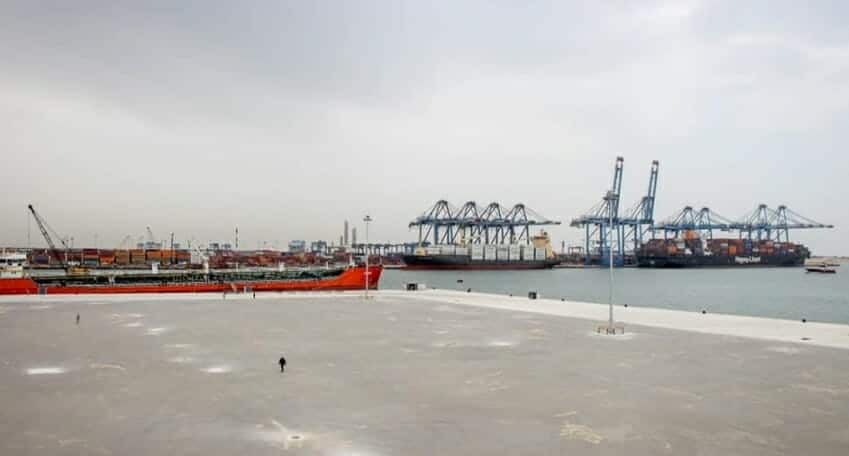The United Arab Emirates (UAE) and Saudi Arabia are engaged in a new bout of competition that could decide which of the two would eventually become the top leader in the logistics sector, in the Middle East.
The UAE, with its five major seaports and half a dozen international airports, should be the natural choice to become the GCC region’s main logistics and transportation hub.
But Saudi Arabia has made public its intentions to replace the UAE and also Qatar, another major player in the region’s logistics sector, by developing the Kingdom as a transportation and logistics hub to connect all continents.
The UAE has a market share of logistics industry is 42% (US$60 billion) compared with Saudi Arabia’s share is 25%.
As the GCC countries have taken up economic diversification programs, sectors like tourism, health, logistics and transportation among others are viewed as major revenue earners in the non-oil segment.
Hence, these countries are looking to develop logistics and engaged in a bitter competition with each other to grab a big pie in the market share.
Another advantage for these countries is their geographic location. They are at the crossroads and can connect with countries in Europe, Africa and Asia within a short time.
As the share of maritime trade is 70% of the global trade, sea freight is the main mode for cargo delivery is logistics and transportation in the GCC region. These nations also export fossil fuels by sea to different countries.
While Dubai and Sharjah have two major seaports each – Jebel Ali & Mina Rashid and Mina Khalid & Khor Fakkan – respectively, Abu Dhabi too has developed Mina Zayed as a world class seaport with the best infrastructure in the region.
Saudi Arabia has developed 10 major seaports, nine international airports, three regional and 17 domestic airports. Besides two new international airports are being constructed in Makkah and Tabuk in the Kingdom.
With so many seaports and airports, Saudi Arabia’s Crown Prince Mohammed bin Salman wants the country to be a transportation and logistics hub connecting Asia, Africa and Europe.
UAE tops the index
Despite all this, the UAE has been placed at the top overall as the most emerging GCC competitive market among 50 countries in the world, the annual Agility Emerging Markets Logistics Index 2021 said.
The UAE also topped in all three individual sub-indices in the region reflecting the government’s stance to strengthen its business environment in the non-oil sectors and successfully implementing the comprehensive national SME development strategy.
The Index ranks 50 countries by factors that make them attractive to logistics providers, freight forwarders, shipping lines, air cargo carriers and distributors. While China, India and Indonesia occupied the top three slots, the UAE was ranked fourth followed by Saudi Arabia (6) and Qatar (9).
In the area of business fundamentals, Gulf countries dominated the top spots. UAE was No. 1, followed by Saudi Arabia (3), Qatar (4), Bahrain (7), Oman (8) and Kuwait (11). Nearby Jordan was 10th.
“Gulf countries are pushing hard to diversify and integrate their economies by developing world-class infrastructure and creating fair, transparent conditions for business,” Elias Monem, Agility Global Integrated Logistics (GIL) CEO for Middle East & Africa, said.
“Good infrastructure and stable business conditions are areas of huge competitive advantage for the Gulf region. They will be key to recovering from the economic downturn brought on by the pandemic,” he added.
Besides maritime development, the UAE has developed a strong road network and laying a 1,200 km railway line within its borders which ultimately connects to the GCC rail network in Saudi Arabia.
The domestic rail network is first in the country and improves domestic logistics sector as the first stage is focusing on introducing freight capacity linking Jebel Ali Port, Khalifa Port and the Port of Fujairah to industrial hubs in Abu Dhabi, Dubai and Ras Al Khaimah.
By this, some 60 million tons of freight can be moved from sea and road to the rail network every year.
Evolving industry in GCC
In its report, the business consulting firm Frost and Sullivan said that the GCC’s logistics industry was evolving rapidly due to increasing share of non-oil contribution to the GDP, infrastructure development, the emergence of free trade zone, industrial parks and increased trade cooperation in the region.
“The industry is expected to grow by 4.3 per cent between 2020 and 2025,” the report said.
Though COVID-19-related disruptions such as lockdowns, travel restrictions, and slowdown in customs clearance caused a slowdown during H1 2020, digital transformation initiatives would play a key role in growth of logistics industry in the region, the report said.
“Port infrastructure development projects in the UAE ‘s Khalifa Port, Oman’s Duqm Port, Saudi Arabia’s Jizan Port and Mubaral Al Kabeer Port in Kuwait are expected to improve regional connectivity. Al Khomra Logistics Zone in Jeddah Port launched by Saudi Ports Authority will be one of the largest in the region,” the report said.








